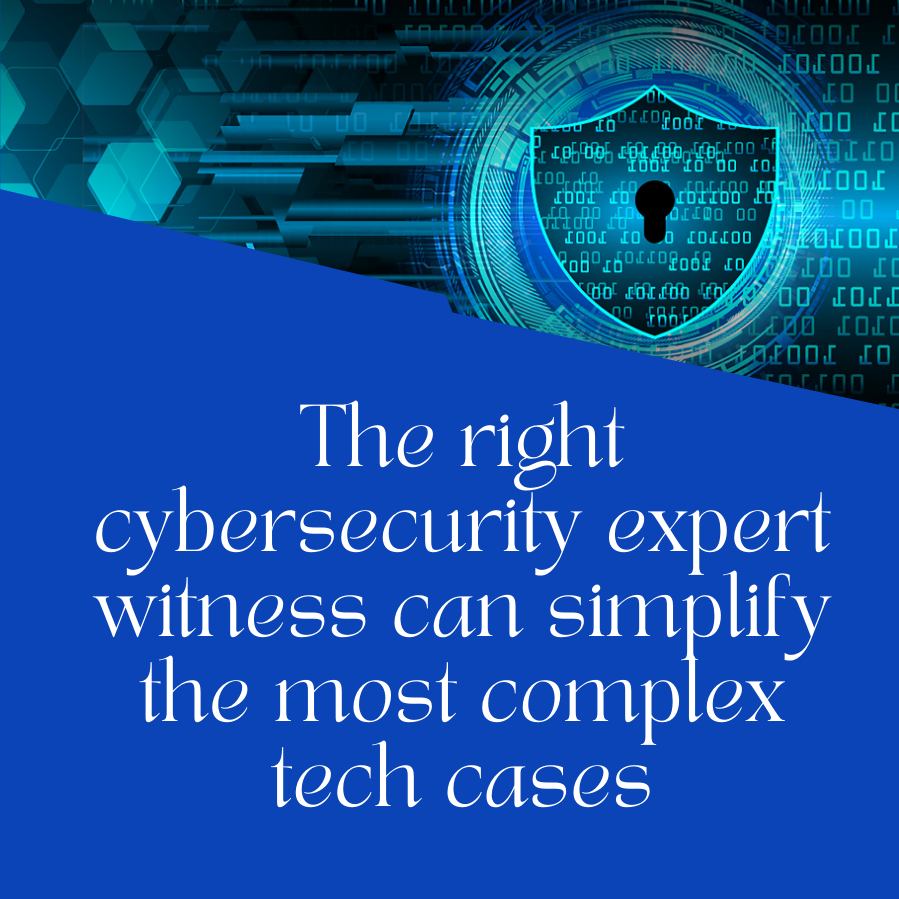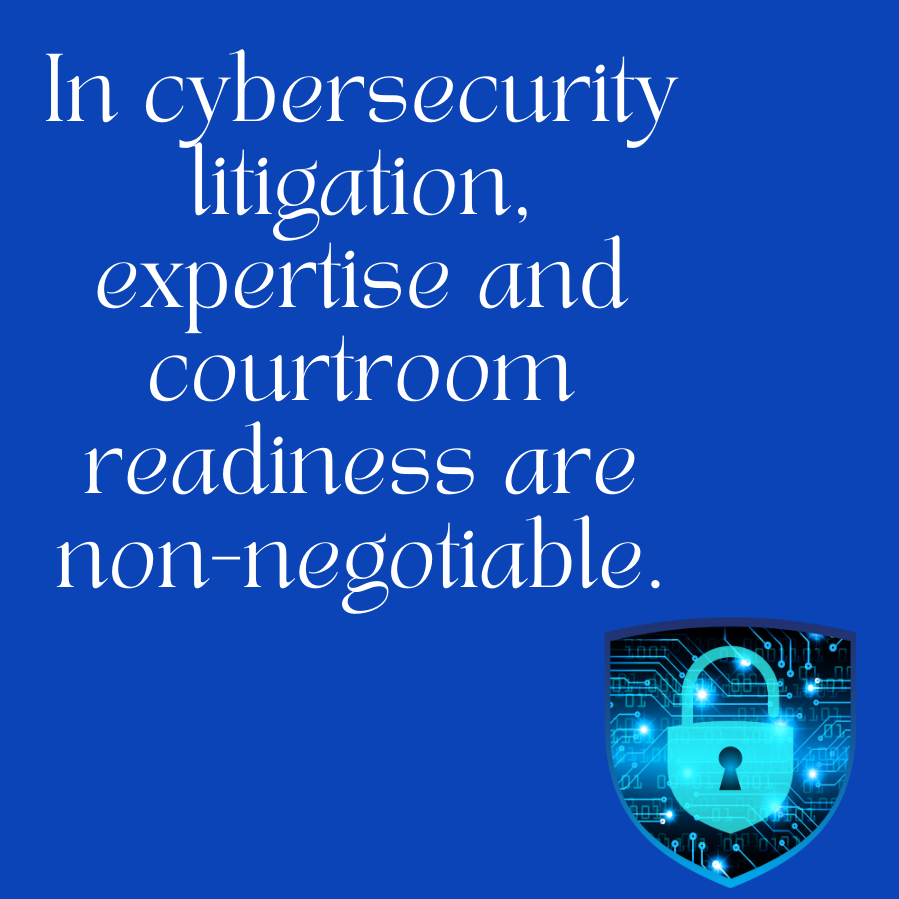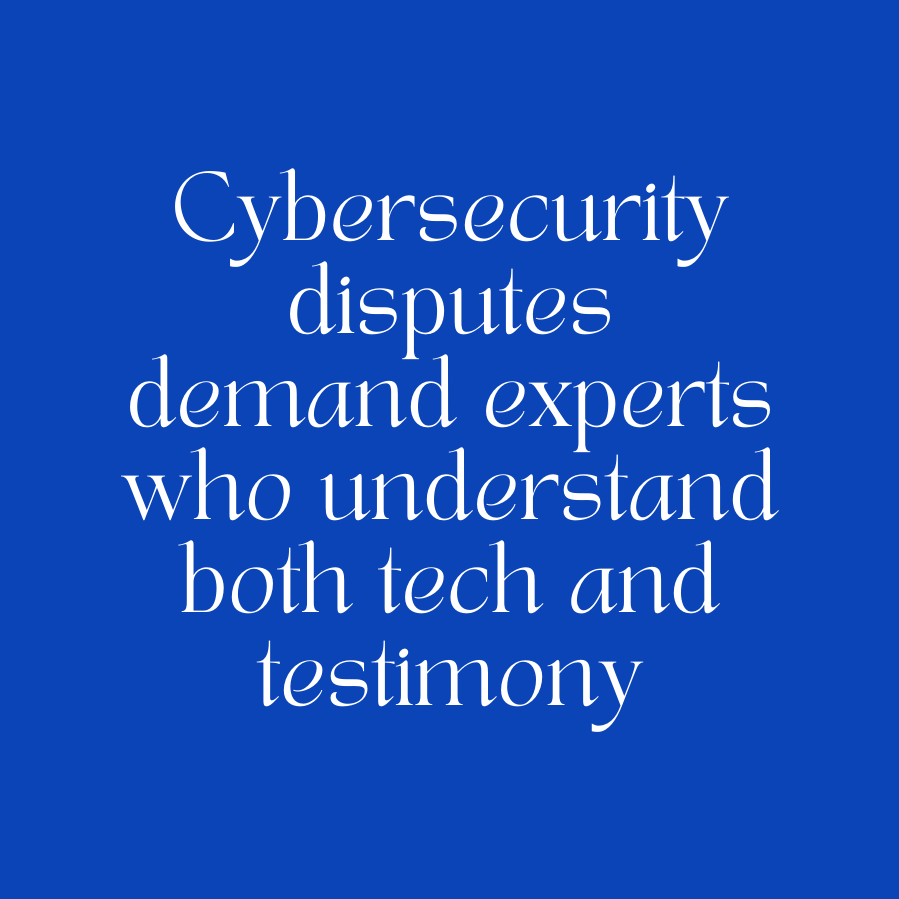Cybersecurity Litigation: Selecting the Right Expert Witness
Navigating the complexities of cybersecurity litigation can feel overwhelming for attorneys, especially when the technical aspects of a case demand an expert touch. Ensuring your arguments resonate with judges and juries often hinges on translating intricate digital issues into clear, relatable narratives. The right cybersecurity expert witness not only brings clarity to these challenges but also reinforces your case with credible, well-structured testimony. By selecting an expert who aligns with your case’s unique needs, you can approach even the most technical disputes with confidence and a sense of control.
Let’s explore the best practices for selecting a cybersecurity expert witness to bolster your case and secure a favorable outcome.
The Role of Cybersecurity Expert Witnesses in Litigation
Cybersecurity expert witnesses are pivotal in translating complex technical issues into understandable terms for judges and juries.

They provide insights into the standards, tools, and methodologies relevant to the case.
Common Types of Cybersecurity Litigation
Data Breach Cases: Assessing the causes, impact, and liability in unauthorized data access incidents.
Ransomware Attacks: Determining fault and calculating damages related to malicious encryption of systems.
Privacy Disputes: Addressing compliance with regulations like GDPR or CCPA.
Intellectual Property Theft: Investigating unauthorized access or theft of proprietary data.
Contract Breaches in Cybersecurity Agreements: Analyzing whether parties adhered to agreed-upon standards for digital security.
1. Key Responsibilities of Cybersecurity Experts
Technical Analysis: Examining digital logs, incident reports, and cybersecurity protocols.
Expert Testimony: Explaining technical evidence in a clear, concise manner during depositions and trials.
Forensic Investigation: Reconstructing cyber events to determine fault and impact.
Why Choosing the Right Expert Witness Matters
Selecting an expert who is both qualified and credible can significantly influence the outcome of your case.
However, the wrong choice may result in weak testimony, diminished credibility, and, ultimately, an unfavorable judgment.
Risk of Inadequate Expertise

Cases involving advanced technologies like encryption algorithms or blockchain require highly specialized knowledge. An expert lacking this expertise risks being discredited in court.
H3: Importance of Credibility
Even a well-qualified expert must convey confidence, impartiality, and clarity. Poor communication skills or perceived bias can undermine their testimony.
Adherence to Legal Standards
Courts often evaluate expert testimony under rules like the Daubert standard, which examines the reliability and relevance of an expert’s methods and conclusions.
Strategies for Selecting the Best Cybersecurity Expert Witness
1. Define the Case’s Technical Needs
Clearly identify the technical issues central to your case. For instance:
Network Security Failures: Look for experts specializing in firewall configurations or intrusion detection systems.
Compliance Issues: Choose an expert well-versed in regulations like HIPAA or PCI DSS.
2. Research Thoroughly
Utilize multiple channels to identify potential experts:
Professional Networks: Seek recommendations from peers who have handled similar cases.
Expert Witness Databases: Platforms like ExpertConnect Litigation Support provide vetted cybersecurity professionals.
Industry Events: Look for speakers or panelists recognized as leaders in their field.
3. Assess Credentials and Experience
Key qualifications to evaluate include:
Educational Background: Degrees in computer science, information security, or a related field.
Professional Certifications: Look for certifications such as Certified Information Systems Security Professional (CISSP) or Certified Ethical Hacker (CEH).
Courtroom Experience: Ensure the expert has a proven track record of delivering testimony that withstands cross-examination.

Case Study: The Impact of Expert Testimony in Cybersecurity Litigation
In a recent case involving a major data breach, a company faced allegations of negligence in protecting customer data. The plaintiff’s legal team enlisted a cybersecurity expert to dissect the company’s protocols, highlighting flaws that led to unauthorized access.
Meanwhile, the defense engaged an expert who demonstrated that the breach resulted from an unprecedented external attack rather than internal negligence.
The contrasting approaches of these experts played a critical role in the trial:
Plaintiff’s Expert: Emphasized the company’s failure to update software patches.
Defense Expert: Highlighted the use of advanced hacking techniques that bypassed industry-standard measures.
Ultimately, the case hinged on the jury’s perception of the credibility and clarity of the expert witnesses.
Avoiding Common Pitfalls in Selecting a Cybersecurity Witness
Overlooking Industry-Specific Knowledge
Ensure the expert has direct experience with the industry in question, whether it’s healthcare, finance, or retail. Each sector has unique cybersecurity challenges and regulatory requirements.
Neglecting Communication Skills
The ability to articulate complex technical details in plain language is critical. Experts who rely on jargon may confuse jurors, diminishing the impact of their testimony.
Ignoring Conflicts of Interest
Thoroughly vet the expert’s background to avoid any affiliations that could be leveraged by opposing counsel to discredit their impartiality.
How Expert Witness Networks Simplify the Selection Process
Engaging an expert witness network can save time and ensure you find the best fit for your case. These networks:
Offer access to a database of pre-vetted cybersecurity professionals.
Provide insights into each expert’s credentials and litigation history.
Streamline the vetting process, allowing attorneys to focus on case strategy.
Benefits of Expert Witness Networks
Efficiency: Quickly connect with qualified experts, reducing delays in case preparation.
Quality Assurance: Rely on experts with proven courtroom success.
Cost Management: Avoid wasted resources on unsuitable candidates.
Preparing Your Cybersecurity Expert for Testimony
Collaborate Early
Engage your expert as soon as possible to align their analysis with your case strategy.
Test Their Communication Skills
Conduct mock trials or pre-trial depositions to ensure your expert can effectively convey their findings.
Validate Their Methodology
Review the expert’s analysis to confirm it aligns with accepted practices and standards in the cybersecurity field.
The Future of Cybersecurity Litigation and Expert
As cyber threats evolve, so will the role of expert witnesses. Emerging technologies like artificial intelligence, quantum computing, and blockchain will introduce new complexities to litigation. Attorneys must adapt by:
Leveraging expert witness networks to access niche expertise.
Staying informed about technological advancements.
Building long-term relationships with trusted experts.
Conclusion: Strengthen Your Case with the Right Cybersecurity Expert Witness
Cybersecurity litigation demands a nuanced understanding of technology, regulations, and industry practices. Selecting the right expert witness is critical to building a compelling case and achieving favorable outcomes.
By leveraging expert witness networks and following best practices for selection, attorneys can confidently address even the most complex cyber disputes.
To streamline the process, consider partnering with ExpertConnect Litigation Support, a trusted provider of pre-vetted cybersecurity experts. Their network ensures you find the right professional for your case quickly and efficiently. Visit their website today to start your search for the ideal cybersecurity expert witness.